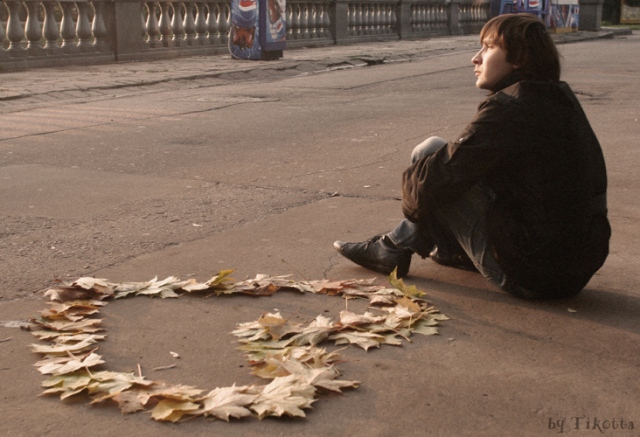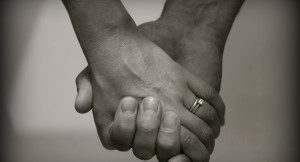Stories about “journeys to Orthodoxy” are very popular on the English-language Orthodox Internet. Usually one feels glad reading about someone’s acquaintance with Orthodoxy, his way to the faith, and his final conversion to the Orthodox Church. But life is not always a fairy-tale with a happy ending. For some, the encounter with Orthodoxy can be a source of pain. We cannot help but publish the following story that we received by email. In order not to leave this letter without a response, we have asked Igumen Raphael (Vereshak), Rector of the Holy Resurrection Russian Orthodox Church in Winnipeg, Canada, to offer a reply. We do hope that it is not yet the end of his journey!
Pravmir’s Staff
What’s in a Troubled Mind?
By Jean-Paul Benony
For the past few years I have been in love with a woman. I still love her, many months after I last saw her, while she doesn’t love me. She is Orthodox. Faith plays an important part in her life, probably the most important part of all. Me, well, I am nothing, I am sorry to say, because it is ruining my life now.
I need to summarize how we came to know each other, in what I feel is a quite honest (it’s always a question of perspective), even if succinct, portrait. We are from two different countries. Let’s just say that English is not my native language. So it started right off with cultural, linguistic, and soon to be religious differences (and age, as I am thirteen years older). I had gotten out of a bad relationship a few months before I met her, which left me pretty shaken, both physically and morally. The last thing I wanted was to meet someone else, but as soon as I saw her I was caught. And I mean caught: she truly was the most beautiful woman I had ever met. I soon learned that she had a boyfriend, and that she lived in the US, far from where I lived. From the start I knew that religion was important to her, and of course she also knew that it wasn’t the same for me. But we were supposed to be on an amazing tour in the Red Center, so in the end it didn’t become an issue, and we got along well during the time we spent together. But, as far as it could have evolved, it was a dead end – anyone could have seen that. Anyway, soon after I returned home we started a pen-pal relationship; we began to write to each other regularly. Of course, I knew that it didn’t mean as much to her as to me, but each one of her emails made my day, and I couldn’t stop myself when I was writing to her. I was in love with her, but didn’t want to say anything about it, because it would have lead to nothing. I think our relationship took a turn two years later, when I joined a humanitarian organization. I decided that if I were to do something with my life (which we’re all suppose to do, but sometimes you end up doing a job that doesn’t give you all what you want), it could be the best way; somehow it was she who gave me the impulse to do it, even if it was something I had in mind for some time. But our discussions and her passion for what she was doing convinced me that I had to make the leap. Somewhere along the way, she broke up with her boyfriend and, away in a totally foreign country, I began to think about seeing her again for real after my mission, and my letters began to be more explicit about my feelings. We never had profound discussions about religion, but I could ask her about Orthodoxy and she was always glad to inform me. Not that we talked directly about the feelings I expressed; she wouldn’t reciprocate or deny them, and I thought she was (wisely) cautious, not knowing if we ever would see each other again. What finally happened?

How can you want something so strongly only to blow it away once it’s in your hands? I asked myself this question quite a few times when it came to other people, not understanding their motives. Now I ask this about myself, months later, still trying to understand what my motives were. I saw her during a break from my mission, so I felt definitely off kilter, not having had enough time to re-adapt myself to the “world.” I realized this some time later, but I still think that I should have overcome this. Maybe religion was a part of the problem. But the truth is that the biggest problem was me. I can only blame it on me. I knew how much Orthodoxy meant for her, I knew it for years, so why did I have to be so moronic when we were right into the subject? For years I waited to be reunited with her, and all she will remember me for will be the stupidities I said about her religion, all the questions I didn’t ask about her faith, my silence when I should have been more active, not being that confident with my English. What does that mean? That I was overwhelmed when I was with her, and that after the things I said maybe I felt she wouldn’t forgive me. Or maybe she would have, if only I had talked to her. Why did I let my chance to be with someone I love more than anything go away? Because I liked my job and wanted to be on as many missions as possible, I would only have been allowed to see her once every six month, and maybe I thought that a woman who wanted a family wouldn’t have tolerated this for long. Or that I would have felt like a total stranger, having to learn an entirely new way of life, and didn’t feel up to the task? That it would have been extremely frustrating for her, having to teach me like a child when she was on another level, and in the end it that it would have been frustrating for the both of us? Or more simply, as a non-religious person, that it would have changed me? I have considered all this, and the only thing that comes to my mind is that, as she was the only thing that mattered, I would have done anything for it to work. It was just too late. The last day I was there I told her my feelings and she said that she didn’t feel the same. Soon after I left she considered our relationship over; since then I don’t exist anymore for her. I can’t blame her, I only wish she had told her side of the story. God, I must have disappointed her so much! The result now is that I hate myself.
I can’t let it go. I try, for my sake and for my mental sanity, but I only come back to what I should have done better. At the beginning of last year I had to check on her Facebook wall to see what was going on in her life (yes, like stalking): I drowned myself in alcohol. Thinking of her now only brings back the greatest sadness, and codeine helps a bit. We weren’t even together! Does it really get better if you talk to God? It probably helps if you share with a friend, family, or a priest, but it doesn’t make the pain disappear. Why should it be different with Him? Isn’t it selfish to think that He would have any interest in me, considering what the world is going through every day? Hurting her is the very last thing I want to do, but I do it continuously, by sending letters and flowers. I know this is pure egoism, but I can’t stand her silence.
I read the article “A Good Man,” and I totally agree that it’s not because you’re part of a NGO and try as much as possible to help others (though I don’t feel for them now, or for anyone else for that matter) that you are indeed a good man. First of all, because I have heard some pretty disturbing stories involving expatriates; then because of my inability to cope, how it affects my mind, and how inevitably it has an effect on my friends and the people I work with. So I don’t consider myself as a good man, I assure you. But would it also mean that at least 30% of the population of my country is not worth having grace in the eyes of God? At the same time “simply” honest, kind, and loyal people don’t make up a majority in this world and, if their actions can help make the lives of others better, maybe they could be considered as such. Maybe, more simply, I just don’t get it. I try. I really do. But what are you supposed to do then, when you think that even God is not enough to help you?
If anything, she has gotten me interested in Orthodoxy and its history, but it’s still a far cry from giving me some peace of mind. I realize that, no matter how many missions I have done and I still am going to do, and no matter how many people I have met who had their lives totally broken and are in so much more distress than I, it doesn’t change anything: my life is stuck on the few moments I spent with her. While looking for Orthodoxy I found this site and I seized the opportunity to share, something I usually wouldn’t do. Egoism again. I am afraid that the time is still far away when the pain will separate from the thoughts. What will remain will be like a cloudy memory, something both there and not quite present at the same time: some kind of an epiphany for a troubled mind, and a realization that I can go forward with my life, at last.
Fr. Raphael’s reply:
My dear—
In regards to your letter, let me first express my sympathy towards you. Such situations as you describe are always most difficult to bear. And whenever love is involved this becomes all the more so.
However, since this your letter was addressed to an Orthodox site and I am an Orthodox priest, this will shape my response. I’m sure you understand. So, first off, let me repeat my sympathy for you and for your present suffering.
How are you to go forward? This is the main question that would strike anyone; it is what you seem to be asking directly. Here we have to be very careful. To dwell only on what has happened to you would be harmful; it will not allow you to go forward with your life. Therefore, you must set your sights more on what is before you than on what has occurred.
Of course, this can sound completely unrealistic amidst your current pain. But detaching ourselves from what keeps us pinned down – our memories and torments and so on – will free us. It allows us to move forward towards what life has to offer us next.
You know that in English we have a saying: “time heals all wounds.” This means that life itself offers us countless opportunities of promise and new opportunities once we pick ourselves up and move forward from where we have been. This is not an idle dream. Life itself is like that. If you can believe, God Himself has arranged our lives to be like that. But, in order to find this new measure of life and the peace this offers, we have move forward, as life itself indicates to us.
I would say that, for whatever it is worth, it is the time to move out from the room marked “pain” and “memory” into that new space of opportunity. If you give this some time, the past is sure one day to become something from which you were able to move forward in a positive way – and even to learn the lessons it provided.
God’s peace be with you!



















